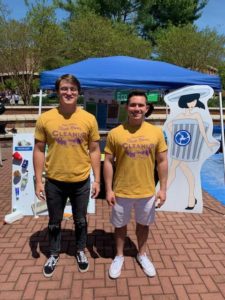Story is co-written with Cami Couch

Damien Gregory, SEI Public Relations Officer, and Aaron Speyer, SEI External Affairs, representing SEI at Mount Trashmore. Photo by Cami Couch.
Western Carolina University’s (WCU) Sustainability Energy Initiative (SEI) is trying to establish composting as a permanent installment on campus.
Composting is the natural process of breaking down organic waste into rich soil. It helps reduce methane emissions, lower one’s carbon footprint, reduce the need for chemical fertilizers and encourages the production of good bacteria and fungi that break down organic matter.
This plan is still in a proposal stage that, if passed, will start implementation towards the end of the Spring semester in 2020.
“If the proposal gets passed, Jeff White, Recycling Coordinator, and an intern will do research to get all the entities involved as far, as dining goes. The intern would help Jeff determine if it was worth it to have composting on campus, [and] do a pilot program,” said Lauren Bishop, Chief Sustainability Officer Director of Sustainability & Energy Management.
The current plan, if the proposal taking place passes, is to have a research intern shadow White and perform a feasibility study of implementing a composting program. The proposal is to be voted on in three weeks. If approved the research intern will start in August and by spring semester WCU will have the answer whether composting is possible on campus. If so, it will be submitted as another proposal in order to implement composting at WCU.
As for the details, not much has been pinned down yet, as that will be one of the many jobs for the intern. White did disclose some of the things he is currently looking into though. White said that some of the things the intern will be responsible for are what type of bins WCU needs for the compost, what kind of funds will be needed, where the composting area will be located, what type of collection schedule is needed and who will provide that collection service. White also discussed how WCU is trying to implement a Class III compost, similar to the one implemented at the Appalachian State University since 1999 by their Sustainability Composting Initiative. A Class III compost means composting partially composted or dehydrated products meaning they will accept yard/garden waste, wood waste, consumer food waste and some manure and agricultural waste. The compost will be entirely organics, but will not include meat, dairy or oils. Currently, WCU’s cooking oils are turned into biofuel oil. By partnering with Blue Ridge Biofuels to recycle this fryer oil WCU Dining can help contribute to sustainability.
In the Spring 2020 semester, WCU will know a lot more about its future of composting, “the opportunity to compost exists for us,” said White.
Below is a short photo-story from the 2019 Mount Trashmore event during this year’s Earth Month Celebration. Additionally, a more in-depth infographic can be found here.
Mount Trashmore, Earth Month and Sustainability at Western Carolina University


